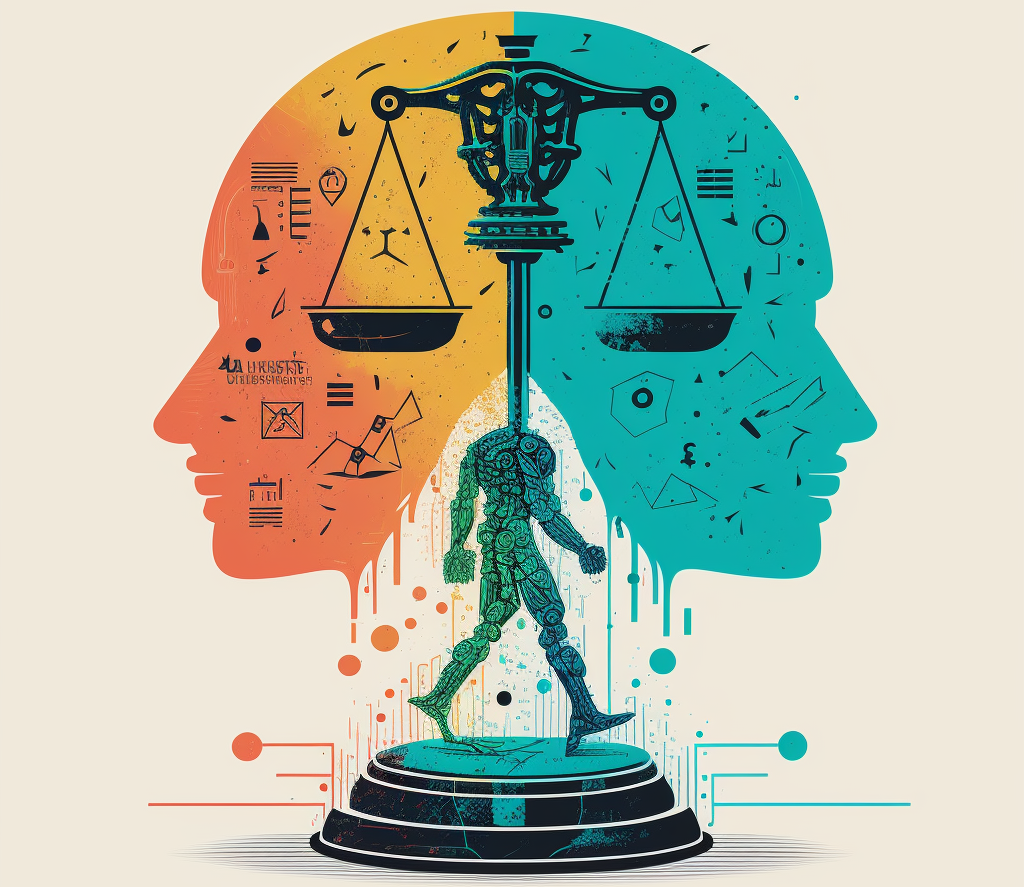The rapid advancement of artificial intelligence (AI) presents a unique set of ethical challenges that demand careful consideration. As we navigate the complexities of AI ethics challenges in balancing innovation and responsibility, it becomes crucial to understand how these technologies can be developed and deployed in a manner that prioritizes human values. This article delves into the intricate relationship between technological progress and ethical accountability, highlighting the importance of responsible AI practices in fostering trust and safety in our increasingly automated world.
In the following sections, we will explore the various dimensions of AI ethics, including the potential risks associated with unchecked innovation and the moral obligations of developers and organizations. Readers will gain insights into real-world case studies that illustrate the consequences of ethical lapses in AI deployment, as well as the frameworks and guidelines that can help mitigate these risks. By examining the balance between innovation and responsibility, we aim to equip you with the knowledge necessary to engage in informed discussions about the future of AI.
Furthermore, we will discuss the role of policymakers, technologists, and society at large in shaping a responsible AI landscape. As you continue reading, you will discover actionable strategies for promoting ethical AI practices and fostering a culture of accountability within the tech industry. Join us on this enlightening journey to understand the critical importance of addressing AI ethics challenges and ensuring that innovation serves the greater good.
As artificial intelligence (AI) continues to evolve, the ethical challenges surrounding its development and deployment become increasingly complex. Striking a balance between innovation and responsibility is crucial for ensuring that AI technologies benefit society while minimizing potential harms. This article explores key subtopics related to AI ethics, highlighting the importance of responsible innovation.
The Role of Transparency in AI Development
Transparency is a fundamental principle in AI ethics, as it fosters trust between developers, users, and stakeholders. When AI systems operate as “black boxes,” it becomes challenging to understand their decision-making processes, leading to concerns about accountability and bias. By promoting transparency, organizations can provide insights into how AI algorithms function, the data they use, and the rationale behind their decisions.
Moreover, transparency can help mitigate risks associated with AI deployment. For instance, when users are informed about the limitations and potential biases of AI systems, they can make more informed decisions about their use. This not only enhances user trust but also encourages developers to prioritize ethical considerations in their design processes.
Addressing Bias and Fairness in AI Systems
Bias in AI systems is a significant ethical concern, as it can lead to unfair treatment of individuals or groups. AI algorithms often learn from historical data, which may contain inherent biases reflecting societal inequalities. Consequently, if not addressed, these biases can perpetuate discrimination in areas such as hiring, lending, and law enforcement.
To combat bias, organizations must implement strategies for identifying and mitigating it throughout the AI development lifecycle. This includes diversifying training datasets, conducting regular audits of AI systems, and involving diverse teams in the design process. By prioritizing fairness, developers can create AI solutions that promote equity and inclusivity.
The Importance of Accountability in AI Deployment
Accountability is essential in ensuring that AI technologies are used responsibly. As AI systems become more autonomous, determining who is responsible for their actions can be challenging. Establishing clear lines of accountability helps to address potential harms caused by AI, whether through unintended consequences or malicious use.
Organizations should develop frameworks that outline the responsibilities of developers, users, and stakeholders in the AI ecosystem. This includes creating mechanisms for reporting and addressing grievances related to AI systems. By fostering a culture of accountability, organizations can enhance public trust and encourage responsible AI innovation.
Ethical Considerations in AI and Privacy
Privacy is a critical concern in the age of AI, as these technologies often rely on vast amounts of personal data to function effectively. The collection, storage, and use of this data raise ethical questions about consent, surveillance, and data security. Organizations must navigate these challenges to protect individuals’ privacy while harnessing the benefits of AI.
Implementing robust data protection measures and ensuring compliance with privacy regulations are essential steps in addressing these concerns. Additionally, organizations should prioritize user consent and transparency regarding data usage. By adopting ethical data practices, companies can build trust with users and promote responsible AI development.
The Impact of AI on Employment and Workforce Dynamics
The rise of AI technologies has significant implications for the workforce, as automation may displace certain jobs while creating new opportunities in others. This shift raises ethical questions about the responsibility of organizations to support affected workers and ensure a just transition to an AI-driven economy.
To address these challenges, companies should invest in reskilling and upskilling programs that prepare employees for the changing job landscape. Additionally, policymakers must consider the broader societal impacts of AI on employment and develop strategies to promote equitable access to new opportunities. By prioritizing workforce well-being, organizations can foster a more inclusive future.
The Ethical Use of AI in Surveillance and Security
AI technologies are increasingly being used in surveillance and security applications, raising ethical concerns about privacy, civil liberties, and potential misuse. While AI can enhance public safety, it is crucial to balance these benefits with the need to protect individual rights and freedoms.
Organizations must establish clear guidelines for the ethical use of AI in surveillance, ensuring that these technologies are deployed transparently and responsibly. This includes conducting impact assessments, engaging with communities, and implementing oversight mechanisms to prevent abuse. By prioritizing ethical considerations, organizations can harness AI’s potential while safeguarding civil liberties.
The Role of Regulation in AI Ethics
Regulation plays a vital role in shaping the ethical landscape of AI development and deployment. As AI technologies evolve rapidly, regulatory frameworks must adapt to address emerging challenges and ensure responsible innovation. Policymakers face the challenge of creating regulations that promote innovation while safeguarding public interests.
Effective regulation should involve collaboration between governments, industry stakeholders, and civil society. By engaging diverse perspectives, policymakers can develop comprehensive frameworks that address ethical concerns while fostering a conducive environment for AI innovation. This collaborative approach can help ensure that AI technologies are developed and used responsibly.
The Future of AI Ethics: Challenges and Opportunities
The future of AI ethics presents both challenges and opportunities as technology continues to advance. As AI systems become more integrated into daily life, ethical considerations will become increasingly important in guiding their development and use. Organizations must remain vigilant in addressing emerging ethical dilemmas and adapting to new societal expectations.
By fostering a culture of ethical awareness and responsibility, organizations can navigate the complexities of AI ethics and contribute to a more equitable and just future. Embracing interdisciplinary collaboration and ongoing dialogue will be essential in addressing the evolving challenges of AI ethics and ensuring that innovation aligns with societal values.
| Challenge | Description | Potential Solutions |
|---|---|---|
| Bias in AI | AI systems can perpetuate or even exacerbate existing biases present in training data, leading to unfair outcomes. | Implement diverse datasets, conduct regular audits, and develop bias detection tools. |
| Privacy Concerns | The collection and use of personal data by AI systems can infringe on individual privacy rights. | Adopt strict data governance policies, use anonymization techniques, and ensure user consent. |
| Accountability | Determining who is responsible for the actions of AI systems can be complex, especially in cases of harm. | Establish clear legal frameworks and guidelines for accountability in AI deployment. |
| Transparency | Many AI systems operate as “black boxes,” making it difficult to understand how decisions are made. | Promote explainable AI models and provide clear documentation of AI decision-making processes. |
| Job Displacement | Automation through AI can lead to significant job losses in various sectors, raising economic concerns. | Invest in retraining programs and create policies that support workforce transition. |
| Security Risks | AI systems can be vulnerable to attacks, which can lead to misuse or harmful consequences. | Enhance security measures, conduct regular vulnerability assessments, and develop robust incident response plans. |
This HTML document provides an overview of the ethical challenges in AI, focusing on balancing innovation with responsibility. Each challenge is described along with potential solutions, formatted in a clear and structured table.



